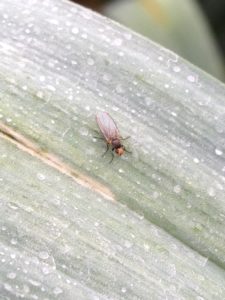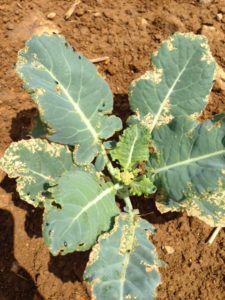Sweet Corn
IPM Program personnel are currently deploying black light and corn earworm (CEW) pheromone trap networks in New Jersey. Limited collections from traps thus far have not contained any target pests. We do not anticipate corn earworm (CEW) or European corn borer (ECB) moths for some time yet, but as numbers increase, look for population maps of ECB, CEW, brown marmorated stink bug (BMSB). The resulting full-state maps will include interpretive information.
Allium leaf miner
Captures of allium leaf miner (ALM) adults on sticky cards are now declining.
 Cards from chive plantings in Mercer and Hunterdon counties have captured 11 and 0 flies/week respectively for the week ending 5/04/22. Our peak period for adult activity appears to have been the week ending 4/21/22, when catches in Mercer and Hunterdon counties were 27 and 45 respectively. At this time, growers should continue to protect all alliums either with row covers, or weekly insecticide applications. IPM personnel will continue to monitor ALM cards to try to identify the end of this first adult flight. Insecticides recommended for ALM management include:
Cards from chive plantings in Mercer and Hunterdon counties have captured 11 and 0 flies/week respectively for the week ending 5/04/22. Our peak period for adult activity appears to have been the week ending 4/21/22, when catches in Mercer and Hunterdon counties were 27 and 45 respectively. At this time, growers should continue to protect all alliums either with row covers, or weekly insecticide applications. IPM personnel will continue to monitor ALM cards to try to identify the end of this first adult flight. Insecticides recommended for ALM management include:
Spinosyn materials (Radiant, Entrust (OMRI approved)), pyrethroids (Mustang Maxx, Warrior), neonicotinoids (Scorpion, Venom) and the insect growth regulator Trigard are labeled for miner control. The diamide, Exirel, is permitted in NJ under a (section 2ee recommendation) as well.
Cole crops
 Recently transplanted crops of broccoli, cabbage, etc. as well as newly emerged seedlings are at risk of damage from flea beetles (see photo at left). Flea beetle activity occurs primarily on warm, still days. Inspect plantings under these fair conditions to get an accurate assessment of population in the field. Flea beetles can do considerable damage to small plants, and have a
Recently transplanted crops of broccoli, cabbage, etc. as well as newly emerged seedlings are at risk of damage from flea beetles (see photo at left). Flea beetle activity occurs primarily on warm, still days. Inspect plantings under these fair conditions to get an accurate assessment of population in the field. Flea beetles can do considerable damage to small plants, and have a  preference for the “hotter” flavored crops like arugula and mustard. They will feed on all brassicas however, and broccoli and Tuscan kale are also favored hosts. Site rotation is critical to managing flea beetle populations because they can build to high numbers in the repeated presence of host crops or host weeds (see photo at right – cabbage transplants with brassica weeds). Scout early and consider treating when 50% or more plants are showing injury and flea beetles are present on plants. Respond quickly to limit injury. Systemic insecticides such as the neonicotinoid (IRAC 4A) class, used at planting, can provide protection from flea beetles for the first critical weeks. Check the Cole Crops section of the 2022/23 Commercial Vegetable Production Guide for a complete list of insecticide recommendations.
preference for the “hotter” flavored crops like arugula and mustard. They will feed on all brassicas however, and broccoli and Tuscan kale are also favored hosts. Site rotation is critical to managing flea beetle populations because they can build to high numbers in the repeated presence of host crops or host weeds (see photo at right – cabbage transplants with brassica weeds). Scout early and consider treating when 50% or more plants are showing injury and flea beetles are present on plants. Respond quickly to limit injury. Systemic insecticides such as the neonicotinoid (IRAC 4A) class, used at planting, can provide protection from flea beetles for the first critical weeks. Check the Cole Crops section of the 2022/23 Commercial Vegetable Production Guide for a complete list of insecticide recommendations.

